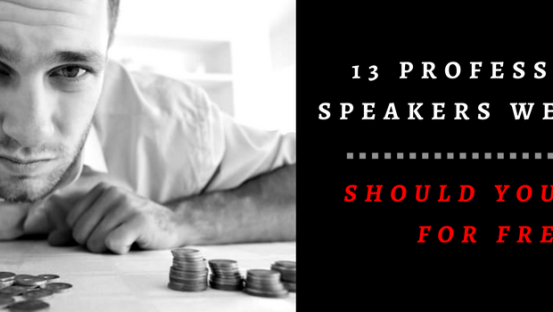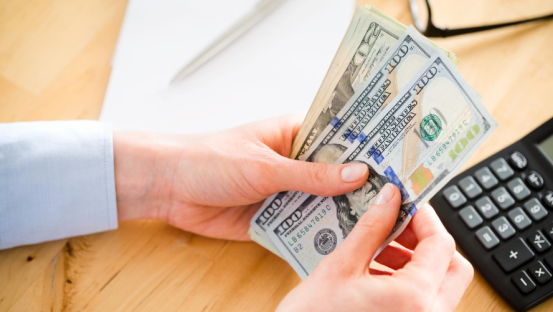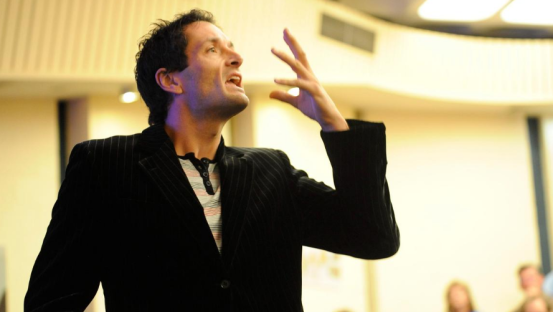20 professional speakers weigh in: What is the best way to say "I don't speak for free."

Speaking for free is a hot topic for speakers. When you are first starting out it is a fantastic way to hone your craft, and is an essential step in learning how to create content and stage presence that resonates with audiences.
But eventually you will need to transition from speaking for free to getting paid to speak, and learning how to say this directly to event organizers can be challenging at first.
In this post we’ve collected advice from 20 professional speakers on how they do it and what, exactly, they say.
This advice originates from a discussion in our LinkedIn professional speaker’s group, “Need a Speaker / Be a Speaker.” See the full discussion by joining here.
What to say
I get to the point by saying, “What kind of budget do you have?”
-Jessica Crew
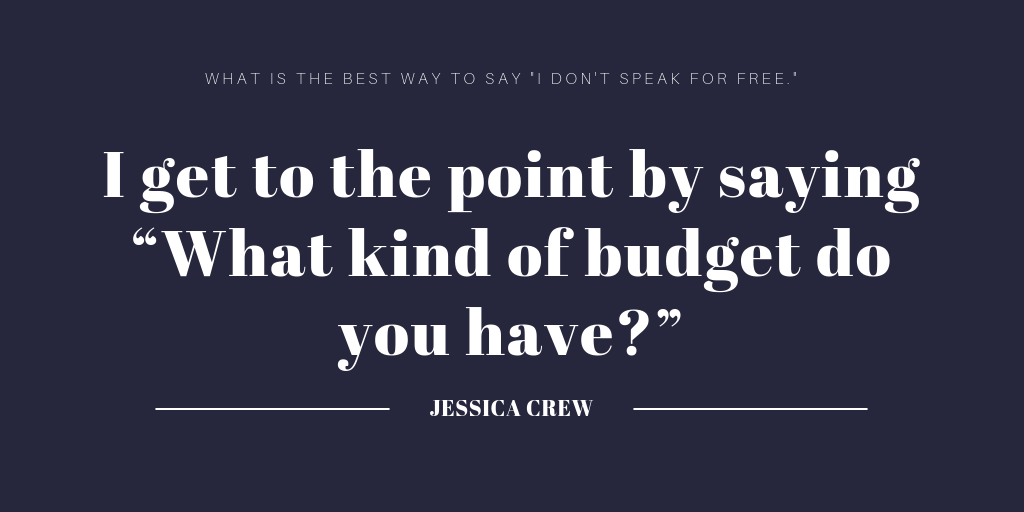
“I let them know that I volunteer my time, the same as the person I am talking to. However, this is my career. "I wouldn't be able to continue to help people if I didn't get paid." Also, "I want to make sure your event participants have the best possible experience. That only happens if you are willing to bring in a professional speaker. When you give your participants value, that is what will bring them back to your event next year, and they will be willing to pay YOU for that."
-Spencer Horn, M.S., CTPC
“I say “My speaking fee is $1000. Give me some details and let me see what I can work out.”
-Dian Bulen Lusher
My approach is to say, “I would love to provide this information to your audience. My fee is xx.” Then they say, “Oh, well that’s out of my budget,” and I reply, “OK. So tell me more about your budget and let’s see if we can work something out.”
-Elizabeth McCoy Employment Services
“I politely say they are not paying me to speak for an hour. They are paying for my years of expertise and experience.”
-Dane L. Logan
“I use this approach, I say “If you have no budget for this speaking engagement, can you give me contact information to peers that I can approach? Speaking is my business. Like any business, there's a cost involved. And a value to the customers who purchase it.”
-Richard Oberbruner
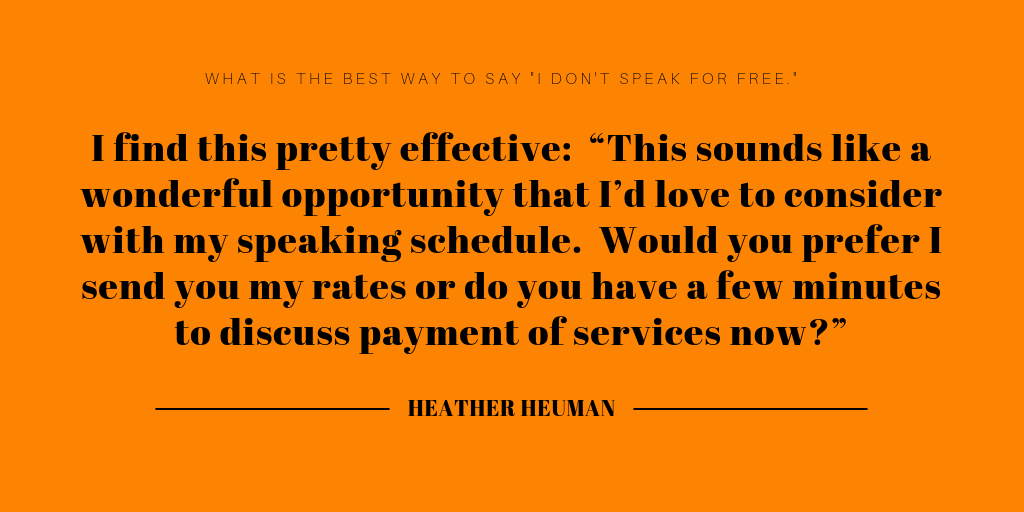
“I find this pretty effective: “This sounds like a wonderful opportunity that I’d love to consider with my speaking schedule. Would you prefer I send you my rates or do you have a few minutes to discuss payment of services now?”
-Heather Heuman, M.A.
“If you can't sell from the stage, then be very concerned about your time and request that they pay, at the very least, for your transportation, meals, and expenses. You can turn it into a vacation for you and a partner.”
-Holly Landau
How to say it
“I like to tell it straight: ‘There are circumstances when I am willing to waive part or all of my speaking fee. I would be happy to explore those with you if you would like.’ They can give the opportunity to sell from the stage, or they can buy a copy of my book for every participant, or something else that can bring in more revenue than my fee. This probably won't lead to a deal if they really expect free speakers, but I don't like to shut down the conversation until we have discussed the possibilities.”
-Alfred Poor
“You have to practice, practice, practice, just like you do when you are preparing your experience for an audience, so that you can look anyone in the eye and quote your fee without blinking! Has to be natural and flowing!”
-Sue Falcone
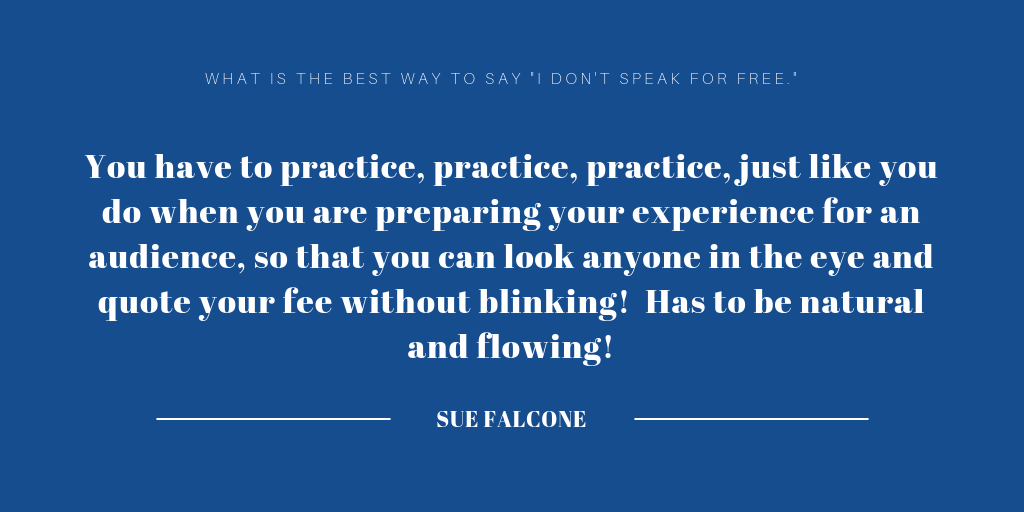
I answer the question directly by saying, "Sorry, but I don't speak for free anymore. The only free speeches I give these days are for charities." Then I just pause. (Note: "non-profit" does NOT mean "charity.")
-Joel Hochberger
I just make sure I clearly state on my website and on my bio: "I am a paid professional speaker..."
-Ralph Graves
When to say it
As part of the initial conversation, I ask, “Do you have a budget for this event?”
-Cheryl Lampard
“When discussing a speaking engagement, always include your fee as if it is a part of everything you do. What you speak about, how long the talk ifor, what you will need as far as ancillary help, and what your fee is.”
-Joanne Dougan, M.Ed.
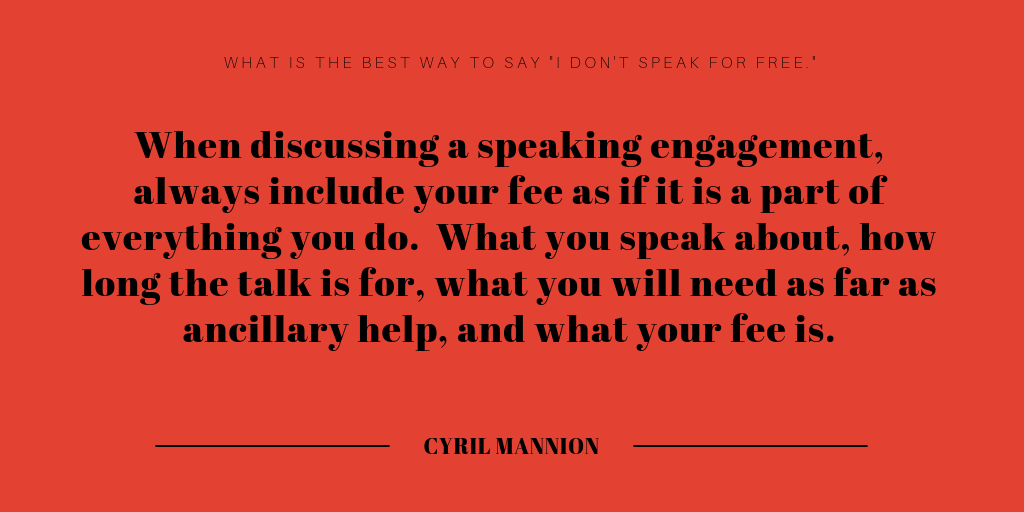
“I thank them for the invitation, ask for details about the event and audience, is it a paid ticket event. Then go on to explain my fee. I watch the body language and hear the reply, if it is around budget or the likes. I say I will follow up with a letter. In that letter I state my fee and put a proposal to them as to how they can have me speak for either xyz to suit budget or free if they provide further opportunities, a letter of recommendation, and allow me access to contact info of the audience, a display table outside the main area for books and to promote my programs .”
-Gwenda Smith
“I say upfront what my fee is and that depending on their circumstances and the cause/event, I am willing to consider adjusting it accordingly.”
-Nigel Lurrie
Should you consider speak for free?
“There's a difference between ‘speaking for no fee’ and ‘speaking for free.’ So it really depends on the opportunity and what you are considering turning down. I speak for a fee and I speak in strategic rooms with no or minimal fee, but I always generate revenue. If I collect a fee of $10k or greater, then great, otherwise I ALWAYS negotiate an opportunity to collect leads and or make an intro offer. There are a number of ways to collect leads informally. The fee is nice, but it’s far more important to have a plan to convert your visibility. Getting paid for a gig is still trading time for dollars—you can do better.”
-Jim Padilla
“I'll consider speaking for free if the audience is a target-rich environment (C-Suite executives, association executives, director-level folks, etc.), so usually, I find out who is in the audience before telling them I don’t speak for free. Never say never—because we've all heard the stories about a free speech turning into a 5-figure engagement or two from someone in the audience.”
-Donn LeVie Jr., CFE

“As a part of my marketing plan I allow for 2 no fee or low fee programs a year. They must fit my criteria of an audience full or at least 80% full of prospects who are my primary target market & attendees must have the authority & ability to pay my fee. I also allow for 2 free programs a year that are a 100% give back to the community. So when someone calls it’s easy for me to explain that their request isn’t a fit for me. I also ask if they are open to sponsorship and sometimes they are more than happy to find a sponsor to cover my fee.”
-Carol Cambridge
Want to find more paid speaking opportunities? Find out how SpeakerHub can help.

